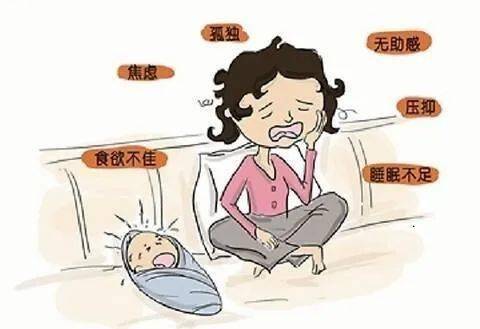Pregnancy and the birth of a newborn herald an unparalleled change and a moment filled with hope for the future. However, for many women, this is a challenging period, and a few expectant mothers may be overshadowed by psychological issues, exacerbated by a prevailing sense of shame.
1
Mental State of Women during Pregnancy and Childbirth
Epidemiological data shows that the prevalence of anxiety and depression during pregnancy and childbirth in developed Western countries ranges from 7% to 40%. In Asian countries, the prevalence of anxiety and depression during pregnancy and childbirth ranges from 3.5% to 63.3%. Clinical data indicates that 70% to 90% of expectant mothers in China experience anxiety, with 20% to 30% suffering from antenatal depression. In the first week postpartum, 50% to 75% of mothers experience negative emotions, and within 6 weeks postpartum, 20% develop typical postpartum depression.
2
Harms of Psychological Issues in Pregnant and Childbearing Women
1
Maternal-Infant Relationship
Such psychological disorders are one of the significant factors leading to premature birth, infant mortality, and severe childhood illnesses; in severe cases, there may even be occurrences of suicide and infanticide.
2
Growth and Development
Pregnancy-related mental health issues can have various adverse effects on the maternal-infant relationship, emotional well-being, behavior, temperament, cognitive development of infants and young children; they may be associated with conditions like autism spectrum disorder, attention-deficit/hyperactivity disorder, juvenile delinquency, thus increasing the likelihood of offspring developing mental disorders.
3
Family Relationships
Severe cases not only affect the normal pregnancy, physical and mental health, marital and family relationships, quality of life, and social functioning of expectant mothers. During this period, the partners and other family members of expectant mothers are also prone to developing psychological issues.
Therefore, common psychological problems during pregnancy and childbirth such as depression and anxiety have become significant global public health and social issues.
3
Mental Evaluation of Pregnant and Childbearing Women
01
Self-Assessment Methods for Pregnant and Childbearing Women
Among the psychological issues during pregnancy and childbirth, the most typical ones are perinatal anxiety and postpartum depression. If the following issues arise during pregnancy, seek professional psychological help promptly.
Image: [Image description]
Importance of Addressing Psychological Issues during Pregnancy and Childbirth
# Worrying excessively, feeling restless and worried all the time, fearing accidents befalling oneself or family members.
# High expectations, never satisfied, always feeling others cannot meet one’s expectations.
# Increased demands, feeling wronged, constantly needing to be appeased and pampered.
# Lowered self-esteem, constantly overthinking, agitated, self-blaming, feeling inferior.
# Decreased abilities, lack of interest in everything, stiff movements, slow thinking, noticeable decline in memory and attention, reduced comprehension.
# Less sleep, poor sleep quality, difficulty falling asleep, shallow sleep, frequent dreams, easy waking up.
02
Psychological Measurement and Evaluation for Pregnant and Childbearing Women
Image: [Image description]
The key to addressing psychological health issues during pregnancy and childbirth lies in prevention, which is superior to treatment. Based on the principles of people-oriented, prevention-first approach, and gradual progression, current research consensus advocates screening high-risk individuals from the beginning of pregnancy, implementing three-tier preventive interventions targeting high-risk factors as a significant measure in preventing and managing psychological issues during pregnancy and childbirth.
The “Expert Consensus on Maternal Psychological Health Management (2019)” states that screening for maternal mental health issues should be a routine component of antenatal care. Pregnant women should undergo regular psychological screenings in early pregnancy (before 13+6 weeks), mid-pregnancy (14-27+6 weeks), late pregnancy (28 weeks and beyond), and 42 days postpartum.
Management of Maternal Mental Health Issues
During routine antenatal care, observe changes in the mental state of expectant mothers, pay attention to risk factors, enhance their emotional management skills, conduct necessary assessments of their mental status, identify crisis situations promptly. Pregnant women with emotional distress or high-risk mental health conditions are advised to seek professional psychological counseling and treatment from certified healthcare institutions.
Consultation Hours for Women’s Mental Health Assessment: Monday to Friday
Address: Room 18, Zone C, 3rd Floor, Outpatient Department
Image: [Image description]
END
Daily Cultural and Philosophical Quote
Trust each other like the liver and gallbladder, wishing to share the autumn moonlight with the world; agree with each other’s aspirations, longing to sit under the spring breeze with the world.
— Chen Jiru
Previous Issues
Witness the obstetrics and gynecology experts with numerous positive reviews, “Praise Team” assembled
Healthy Pregnancy, Joyful Childbirth! Expectant mothers under Chen Haixia’s team, come express your appreciation to your “personal doctor”
Official WeChat platform of Lianyungang Maternal and Child Health Hospital
Contributed by/Women’s Mental Health Department, Xu Shihong
Layout/Health Education Department, Chen Yanhui
Editing/Health Education Department, Bu Yujie
Produced by the Publicity and External Liaison Department


